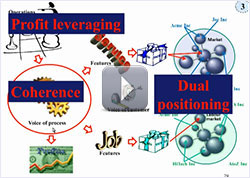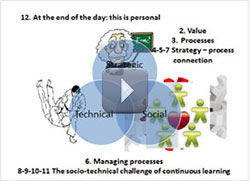1.1 Deploying complex services for maximum value creation
A process is a system of activities (together with the associated resources) that takes an input and transforms it into an output of greater value for a customer. It is processes that create value.
The video focuses on complex services, that is, services sought because of a lack of knowledge or skills. Complex services fall into three categories: professional services, semi-professional services, and technical services. This video also deals with the many organizations, such as hospitals and banks, insurance and telecommunications company, that provide services requiring a mixture of professional and other services to produce the results that customers or clients want.
Professionals, semi-professionals, and technical workers laboring in all spheres of human endeavor, from law to medicine, from accounting to engineering, who are involved or are interested in taking part in managing their businesses will find this overview invaluable for achieving success.
Part 1 – Introduction – Value and the customer experience
Quality in complex services (CS) involves leadership – this is not the fast food business. Understanding who the customer is and what he does is even more important in CS: He is co-producing the outcome. Whoever produces a customer experience lives an experience herself: only positive experiences on both sides of the encounter are sustainable.
Part 2 – Understanding processes, focus and scope
The organization’s knowledge is imbedded in processes: shared ways of adding value, that translate into a chain of commitments distributed logically in the organization. The only sustainable source of strategic advantage is the ability to learn (i.e. augment knowledge) faster than your competitors : understanding variation, thinking statistically, and managing processes are central to this endeavor. Any strategic move that you decide to make will only generate strategic advantage if you can translate it into the right change to the right processes, and execute quickly and flawlessly.
Part 3 – Sustainable competitive advantage through faster learning
Fast and effective learning cycles require a solid connection to strategy, shared methodologies and tools, and an ability to mobilize people behind focussed improvement efforts. Beware of management fads. Isolate and evaluate the new elements carefully, and make an enlightened decision about whether or not it fits your culture and can be a valuable addition to your learning strategy. Many organizations make it to « good enough ». Few organizations cross the chasm from good to great. While the specific recipe required to do so may be debatable, rigor is definitly a part of it. From business model to customer focus, from process management to team empowerment, from systems thinking to analysis of variation, no sustainable learning, i.e. no sustainable strategic advantage is possible without it.



